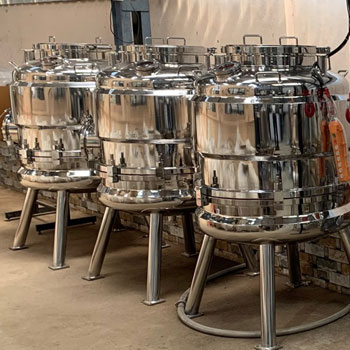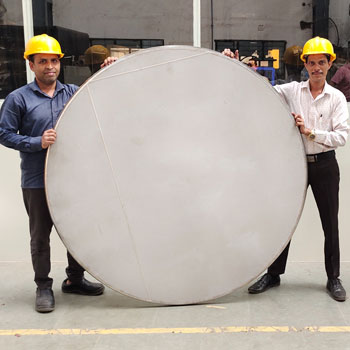
Designed to operate under pressure, these systems speed up filtration especially for fine particle slurries. Pressure is applied from the top or a combination of pressure and vacuum ensuring fast efficient filtration.

Filtration and drying are essential processes in many industries often involving the separation of solid particles from liquids. The Nutsche filter is a commonly used batch filtration system to separate solids from liquids combining both filtration & drying. Nutsche filtration system consists of a cylindrical shell with a perforated plate that holds a nutsche filter cloth or sintered metal filter media. These filters operate effectively under both pressure and vacuum conditions. They can also be agitated to carry out multiple functions ultimately leaving behind a solid filter cake. This closed structure of the nutsche filter diagram ensures efficient filtration and drying making it ideal for industries such as pharma and chemicals.
As a leading Nutsche filter manufacturer in India, we provide advanced Nutsche filtration for efficient liquid-solid separation. Our Nutsche filters are designed with a fully non-metallic design offering exceptional corrosion resistance making them suitable for handling a wide range of acids and salts at high temperatures.
Our Nutsche filters consist of a robust four-legged frame with castor wheels allowing for easy mobility and flexible positioning in various industrial applications. Equipped with a vacuum filtration system, these filters include a cylindrical shell, a top dished end and a perforated base plate that supports either a bolted filter cloth or sintered stainless steel filter media, ensuring high-quality filtration and purity. Our Nutsche filters are available with removable baskets for smaller diameters facilitating efficient solid transport to downstream processing.
The nutsche filtration process is a highly efficient method for separating solids from liquids, commonly used in industries such as pharmaceuticals, chemicals, and food processing. Here is a step-by-step guide to the nutch filtration process:
The slurry (liquid mixture containing solids) is poured into the nutsche filter, which is a cylindrical vessel with a filter media at the bottom. This filter media can be a cloth, mesh, or sintered metal plate, depending on the desired particle size retention.
A vacuum is created at the bottom of the container, causing a pressure difference that pulls the liquid through the filter. This leaves solid particles trapped on the filter as a residue, while the liquid passes through.
Once the liquid has been filtered, optional washing steps can be performed by adding additional solvent to the cake and repeating the filtration process.
After the final wash, gas is passed through the filter cake while the agitator compresses the cake and closes any cracks. This compaction helps reduce residual moisture and ensures a uniform flow of gas or liquid through the cake to improve overall filtration performance.
In the final drying phase, any residual moisture is effectively removed from the filter cake. By maintaining a vacuum or applying gentle heat, the filter cake undergoes thorough drying, ensuring optimal moisture reduction.
This final step of the nutsche filtration is managed through a sidewall valve or port on the vessel. The agitator gradually lowers while rotating, efficiently moving liquid or gas toward the discharge valve. This design allows for flexible discharge of substances like dry solids, wet solids, slurries, or even liquids to discharge in the specific application requirements.
Nutsche filters are available in various configurations each designed to cater to specific industrial filtration needs. Below are the key types of Nutsche filtration:

Designed to operate under pressure, these systems speed up filtration especially for fine particle slurries. Pressure is applied from the top or a combination of pressure and vacuum ensuring fast efficient filtration.

Essential for supporting filter media, Nutsche filter plates are flat perforated components that allow filtrate to pass while retaining solids. They can be customized with filter cloth or sintered stainless steel media for durability.
Nutsche filters are highly used for separating solids from liquids in industries like chemical processing & pharmaceuticals etc. We offer various nutsche filtration for below industries.
Nutsche filtration is a batch filtration process that separates solids from liquids using vacuum or pressure in a closed vessel, commonly used in industries like pharmaceuticals and chemicals.
A nutsche filter works by applying vacuum or pressure to force the liquid through a filter medium, leaving behind a solid layer or "cake" that can be further processed or dried.
Nutsche filtration systems are vary based on size, materials, capacity, and features, typically ranging from a few thousand to tens of thousands of dollars.
Sparkler Filters are used primarily for filtering liquids, it has multiple filter plates and operates under pressure without drying particles. Nutsche Filter is a closed system suitable for filtering and drying by allowing precise temperature, pressure, and vacuum control.
Nutsche Filter Dryer is a type of nutsche filtration that combines filtration and drying processes in one unit. It allows for efficient separation and drying of solids, with features for temperature and vacuum control, making it ideal for handling sensitive or hazardous materials.